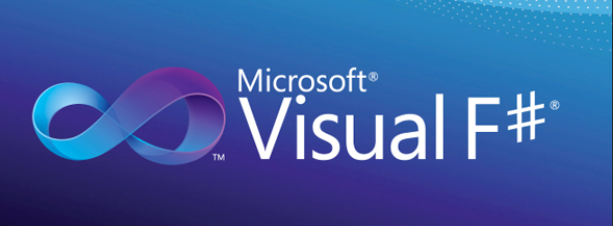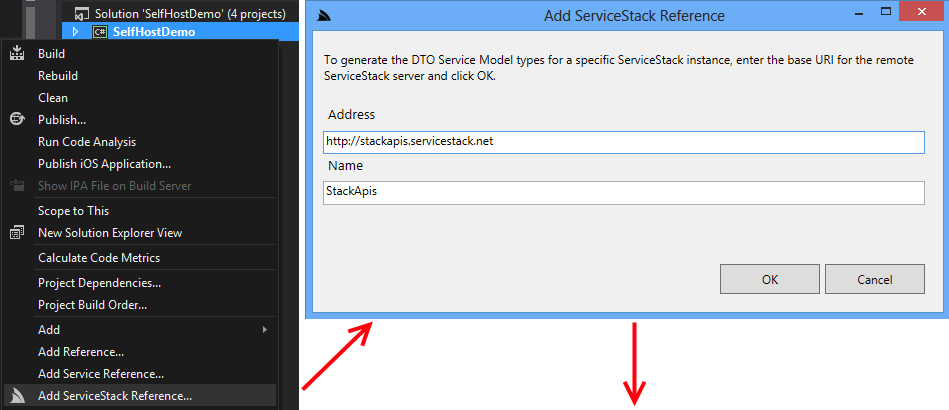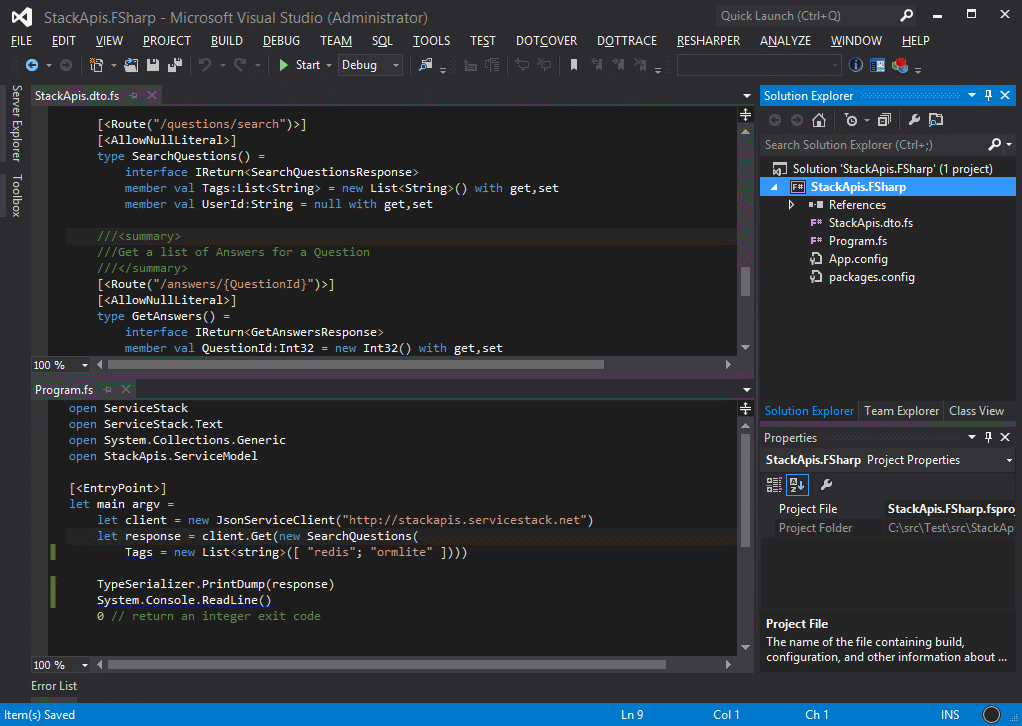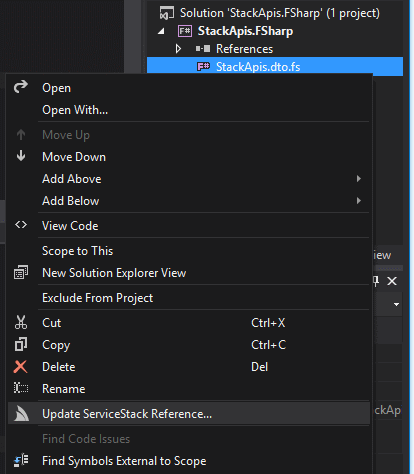
ServiceStack's Add ServiceStack Reference feature allows clients to generate Native Types from directly within VS.NET using ServiceStackVS VS.NET Extension - providing a simpler, cleaner and more versatile alternative to WCF's Add Service Reference feature that's built into VS.NET.
The article outlines ServiceStack's support generating F# DTO's - providing a flexible alternative than sharing your compiled DTO .NET assembly with clients. Now F# clients can easily add a reference to a remote ServiceStack instance and update typed DTO's directly from within VS.NET - reducing the burden and effort required to consume ServiceStack Services whilst benefiting from clients native language strong-typing feedback.
Add ServiceStack Reference
The easiest way to Add a ServiceStack reference to your project is to right-click on your project to bring up ServiceStackVS's Add ServiceStack Reference context-menu item. This opens a dialog where you can add the url of the ServiceStack instance you want to typed DTO's for, as well as the name of the DTO source file that's added to your project.
After clicking OK, the servers DTO's and ServiceStack.Client NuGet package are added to the project, providing an instant typed API:
Update ServiceStack Reference
Updating a ServiceStack reference works intuitively where you just have to click on the DTO's you want to update and click Update ServiceStack Reference on the context menu:
As there's no configuration stored about the ServiceStack Reference you might be wondering how this works? The Update ServiceStack Reference context menu only appears on F# source files ending with .dto.fs or .dtos.fs. It then uses the BaseUrl in the metadata comments for where to fetch and update to the latest F# server DTO's.
Console Demo

F# Client Example
Just like with C#, F# Native Types can be used in ServiceStack's Generic Service Clients providing and end-to-end Typed API whose PCL support also allows F# to be used in mobile clients apps without having to share compiled DTOs:
let client = new JsonApiClient("https://blazor-vue.web-templates.io")
let response = client.Get(new SearchQuestions(
Tags = new List<string>([ "redis"; "ormlite" ])))
Inspect.printDump(response)
Change Default Server Configuration
The above defaults are also overridable on the ServiceStack Server by modifying the default config on the NativeTypesFeature Plugin, e.g:
var typesConfig = this.GetPlugin<NativeTypesFeature>().MetadataTypesConfig;
typesConfig.AddDataContractAttributes = false;
...
Constraints
As the ordering constraint in F# conflicted with the ordering of types by C# namespaces, the cleanest approach was to add all DTO's under a single namespace. By default the namespace used will be the base ServiceModel namespace which is overridable with the GlobalNamespace Config:
typesConfig.GlobalNamespace = "Client.Namespace";
This does mean that each type name needs to be unique which is a best-practice that's now a requirement in order to make use of F# native types. Another semantic difference is that any C# nested classes become top-level classes when translated to F#.
FSharp Configuration
The header comments in the generated DTO's allows for further customization of how they're generated where ServiceStackVS automatically watches for any file changes and updates the generated DTO's with any custom Options provided. Options that are preceded by a F# single line comment // are defaults from the server that can be overridden, e.g:
(* Options:
Date: 2025-06-04 09:53:35
Version: 8.80
Tip: To override a DTO option, remove "//" prefix before updating
BaseUrl: https://blazor-vue.web-templates.io
//GlobalNamespace:
//MakeDataContractsExtensible: False
//AddReturnMarker: True
//AddDescriptionAsComments: True
//AddDataContractAttributes: False
//AddIndexesToDataMembers: False
//AddGeneratedCodeAttributes: False
//AddResponseStatus: False
//AddImplicitVersion:
//ExportValueTypes: False
//IncludeTypes:
//ExcludeTypes:
//InitializeCollections: False
//AddNamespaces:
*)
To override a value, remove the // and specify the value to the right of the :. Any value uncommented will be sent to the server to override any server defaults.
We'll go through and cover each of the above options to see how they affect the generated DTO's:
MakeDataContractsExtensible
Add .NET's DataContract's ExtensionDataObject to all DTO's:
[<AllowNullLiteral>]
type GetAnswersResponse() =
interface IExtensibleDataObject with
member val ExtensionData:ExtensionDataObject = null with get, set
end
member val Ansnwer:Answer = null with get,set
member val ExtensionData:ExtensionDataObject = null with get,set
AddReturnMarker
AddReturnMarker annotates Request DTO's with an IReturn<TResponse> marker referencing the Response type ServiceStack infers your Service to return:
type GetAnswers() =
interface IReturn<GetAnswersResponse>
member val QuestionId:Int32 = new Int32() with get,set
INFO
Original DTO doesn't require a return marker as response type can be inferred from Services return type or when using the %Response DTO Naming convention
AddDescriptionAsComments
Converts any textual Description in [Description] attributes as F# Doc comments which allows your API to add intellisense in client projects:
///<summary>
///Get a list of Answers for a Question
///</summary>
type GetAnswers() =
...
AddDataContractAttributes
Decorates all DTO types with [DataContract] and properties with [DataMember]:
[<DataContract>]
[<AllowNullLiteral>]
type GetAnswers() =
interface IReturn<GetAnswersResponse>
[<DataMember>]
member val QuestionId:Int32 = new Int32() with get,set
AddIndexesToDataMembers
Populates a DataMember Order index for all properties:
[<DataContract>]
type GetAnswers() =
interface IReturn<GetAnswersResponse>
[<DataMember(Order=1)>]
member val QuestionId:Int32 = new Int32() with get,set
Requires AddDataContractAttributes=true
AddGeneratedCodeAttributes
Emit [<GeneratedCode>] attribute on all generated Types:
[<GeneratedCode>]
type GetAnswers() = ...
AddResponseStatus
Automatically add a ResponseStatus property on all Response DTO's, regardless if it wasn't already defined:
type GetAnswersResponse() =
...
member val ResponseStatus:ResponseStatus = null with get,set
AddImplicitVersion
Lets you specify the Version number to be automatically populated in all Request DTO's sent from the client:
type GetAnswers() =
interface IReturn<GetAnswersResponse>
member val Version:int = 1 with get, set
...
This lets you know what Version of the Service Contract that existing clients are using making it easy to implement ServiceStack's recommended versioning strategy.
IncludeTypes
Is used as a Whitelist that can be used to specify only the types you would like to have code-generated:
/* Options:
IncludeTypes: GetTechnology,GetTechnologyResponse
Will only generate GetTechnology and GetTechnologyResponse DTO's, e.g:
type GetTechnology() = ...
type GetTechnologyResponse() = ...
Include Request DTO and its dependent types
You can include a Request DTO and all its dependent types with a .* suffix on the Request DTO, e.g:
/* Options:
IncludeTypes: GetTechnology.*
Which will include the GetTechnology Request DTO, the GetTechnologyResponse Response DTO and all Types that they both reference.
Include All Types within a C# namespace
If your DTOs are grouped into different namespaces they can be all included using the /* suffix, e.g:
/* Options:
IncludeTypes: MyApp.ServiceModel.Admin/*
This will include all DTOs within the MyApp.ServiceModel.Admin C# namespace.
ExcludeTypes
Is used as a Blacklist where you can specify which types you would like to exclude from being generated:
/* Options:
ExcludeTypes: GetTechnology,GetTechnologyResponse
Will exclude GetTechnology and GetTechnologyResponse DTO's from being generated.
InitializeCollections
Lets you automatically initialize collections in Request DTO's:
type SearchQuestions() =
interface IReturn<SearchQuestionsResponse>
member val Tags:List<String> = new List<String>() with get,set
AddNamespaces
Include additional F# namespaces, e.g:
/* Options:
AddNamespaces: System.Drawing,MyApp
Where it will generate the specified namespaces in the generated Types:
open System.Drawing
open MyApp


